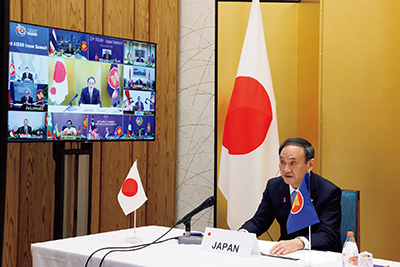ODA Topics 1
ASEAN Centre for Public Health Emergencies and Emerging Diseases
—Driving Japan-ASEAN cooperation toward the realization of a “Free and Open Indo-Pacific (FOIP)” by strengthening capabilities to respond to infectious diseases—

Prime Minister Suga attending the 23rd Japan-ASEAN Summit Meeting (Photo: Cabinet Public Affairs Office of the Government of Japan)
The coronavirus disease (COVID-19) has been raging across the world, and it has greatly impacted societies and economies in the Indo-Pacific region. The numbers of infections and deaths are still increasing around the world as of the end of December 2020, and large-scale lockdowns and other restrictions are having severe impacts on citizens’ lives.
ASEAN*1, which has been a long-term partner of Japan, is no exception. Even in the ASEAN region, which had recorded a low number of infections at the start of the year, the number of infections increased rapidly in a number of countries around April, highlighting the importance of establishing countermeasures against infectious diseases. This region has close geographical, social, and economic ties with Japan, and many Japanese companies have expanded their businesses in the region. Strengthening ASEAN’s regional capabilities to cope with infectious diseases not only contributes to the region as a whole, but is also extremely important from the perspective of ensuring the safety of Japanese people living in the region, as well as preventing the spread of infectious diseases in Japan. Furthermore, for Japan, which has set forth the promotion of a “Free and Open Indo-Pacific” as a pillar of its diplomacy, supporting efforts to strengthen the infectious diseases response system in ASEAN countries, which is key to achieving this goal, is a top priority.
Under these circumstances, in response to a request from the ASEAN Secretariat, then Prime Minister Abe announced at the Special ASEAN Plus Three (Japan-China-Republic of Korea) Summit on COVID-19 held on April 14, 2020 that Japan would strongly support ASEAN on three pillars; namely, strengthening of ASEAN’s infectious disease response capability, the ASEAN Centre for Public Health Emergencies and Emerging Diseases, and support for strengthening the resilience of the economy.
The ASEAN Centre for Public Health Emergencies and Emerging Diseases, positioned as a regional resource hub, aims to strengthen ASEAN’s capabilities in preparing for, detecting, and responding to public health emergencies and emerging diseases. Specifically, plans for the Centre include enhancing surveillance and field epidemiology, creating regional reference laboratory networks*2, and conducting training for personnel responsible for public health emergencies and emerging diseases, among other activities. Japan has contributed approximately ¥5.5 billion ($50 million) to the Japan-ASEAN Integration Fund (JAIF*3) toward the establishment of this Centre.
With a view to establishing the Centre as soon as possible without losing momentum, Japan has been conducting a feasibility study (FS*4) since June 2020 in cooperation with experts from ASEAN countries, as well as various regions and organizations including the United States, Australia, and the World Health Organization (WHO).
Preparations for the establishment of this Centre have been moving forward together with ASEAN, while also fully respecting ASEAN’s needs and intentions, and the ASEAN member states have shown great interest in the initiative. The Mekong countries welcomed Japan’s cooperation at the Mekong-Japan Foreign Ministers’ Meeting held in September, while ASEAN member states commended Japan’s cooperation at the Japan-ASEAN Foreign Ministers’ Meeting and expressed that they were looking forward to the official announcement of the establishment of this Centre at the upcoming Japan-ASEAN Summit Meeting. The establishment was officially announced by Prime Minister Suga together with the leaders of ASEAN countries at the 23rd Japan-ASEAN Summit Meeting in November. On this occasion, the leaders of the ASEAN side expressed their appreciation for Japan’s support.
To develop the ASEAN Centre for Public Health Emergencies and Emerging Diseases into an organization that protects the people of ASEAN from the threat of infectious diseases as a regional hub for public health emergencies and emerging diseases, Japan will spare no effort in providing continuous support to further accelerate the initiative, while also providing as much knowledge as possible. Going forward, Japan, as a true friend of ASEAN, will continue to work together with the region to overcome this difficult period and advance firmly toward realizing greater prosperity for a “Free and Open Indo-Pacific.”
*1 ASEAN comprises the following 10 member states: Brunei, Cambodia, Indonesia, Laos, Malaysia, Myanmar, the Philippines, Singapore, Thailand, and Viet Nam. (Singapore and Brunei are not eligible to receive official development assistance (ODA).)
*2 A network of reference laboratories for realizing early-stage testing of pathogens, among other activities.
*3 See the glossary.
*4 See the glossary.
